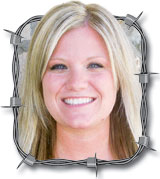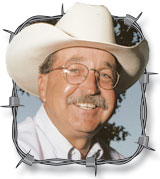A drive through our beloved Ozarks hills is always inspiring. Until, however, I begin to see the "developed" areas just outside Springfield and when I hit the Branson area.
Forgive me, but to see the metropolia growing out of the once beautiful mountains and valleys, it is akin to seeing – well let's put it this way. I remember the country when it had tourist attractions of a more rustic nature.
Accordingly, I dug out my files of old columns, this one dating back to the early 1970s.
Dateline: Ocie, Mo.
The old log cabin rests beside U.S. 160 as if it had grown there.
Deer antlers and a sun-bleached cow skull adorned the chinked walls, as well as bits and pieces of old iron. A battered board wall attaches the cabin to an equally battered barn.
The whole place is a mess.
But a mess that invites the curious, the diggers in old junk piles. There is no gold in those piles of ancient wagon wheels, plows or dog houses. Is this outside trapping perhaps a lure?
And so you open the door – the glass partially broken and a bit of cardboard thrust in the hole – and step inside.
A dim, bare bulb lights the place. A rickety King heater thrusts out an aura of warmth. Burning wood is a perfume of sorts.
And there, sitting beside the stove, legs crossed, cap pulled down half over his eyes, is the sole proprietor of this establishment.
"I'm Mr. Hodges – what's left of him," he announces. "I'm 89 years old, since you ask, and my address is Ocie." For those not well-versed in Ozarks geography, Ocie is a tiny Ozark County village, by the Taney County line, about midway between Gainesville and Forsyth.
The interior of the tiny cabin would make an antique hunter drool like a hound with hydrophobia. There are old guns, cartridge belts, cow bells, long horns and a… "Is that an oxen yoke, Mr. Hodges?"
Frank G. Hodges packs tobacco in his pipe, lights it and says, "Nope. That's a calf yoke. Used it to break calves so's they'd know how to act when they got big."
"How long have you lived here?"
"Seventy years, come first day of April. I've operated this business 15 years."
"Where did you get all this stuff?"
"I collect odds and ends," he said. "Somebody got something they tired of looking at, they bring it up here and hang it up."
"What do you sell?"
"Horses. I've got registered Fox Trotters. Coon hounds and milk goats. I sold out of fightin' roosters."
A shot pouch, powder horn and muzzle loader hang from a peg behind Mr. Hodges. Nodding toward them, a visitor asks, "How much for that?"
"Aint' nothin' in here for sale."
"Why not?"
"Why not?" he sputtered. "Why, hell, if I sold it I'd spend the money and not know what went with it, like I done before."
"Well, why do you keep it?"
"If I didn't like to look at it, I'd haul off and sell it."
Three ears of yellow corn hang from the roof. There are turkey feathers, saddles, bridles and bits and a kerosene lamp. And baseball gloves, surely the first ones ever made.
"Were you a ball player?"
"Yep. Played one year with Springfield Normal. Played first base." He picked up the old first baseman's mitt and tried it on, smacking the pocket with a gnarled fist. "George Sisler model," he said. "This was the first one came out you could catch one-handed with."
He fumbled through a cigar box and brought forth a dog-eared, mouse-chewed Spalding's Athletic Library Book. "Look here. A first base mitt like that cost $1.50. Now, the boys pay $10 or $12 for one."
Cattle dehorners dangle, and hypodermic needles grace an old glass store show case. "What's those for?"
"Used to be a vet." His spit sizzles on the King heater and tobacco aroma fills the cabin. "I got a diploma." He motions toward a dusty framed document on the wall, then gets up and procures a magazine page of color photos. "Long time ago a feller from St. Louis came down and did a story on me. The photographer, he said he wanted some pictures of me doing some vet work, and so we got a call.
"I had to go clean a cow and when he saw that, he went behind the barn so I couldn't see him get sick. When I got the afterbirth out I showed it to him, and he got sick again." Frank Hodges laughs merrily at the memory, and his gums gleam.
His saddles bear no dust. He explains, "I ride every day, if it ain't too rough weather. Next-to-last show I rode in, I got two trophies." He waves a hand to indicate them.
"Why do you stay out here instead of your house?"
He spits as if disgusted. "I like it out here. I got waterin' and feedin' to do. People come and loaf with me."
"What about tourists?"
"Oh, they stop and take pictures and I just go along with 'em. They get mad because I won't sell 'em anything. They's a set of oxen shoes nailed out there on the wall.
"One feller was going to take them off and I told him he was not about to. He had his car parked out there and he tore out and opened the door and stopped and said, 'What are you going to do with that G.D. outfit if you die?'
"I said, 'Mister, I done got arrangements made to take it with me.' I got shut of him right quick."
He gets up, goes outside and lets another tourist snap his picture. "Well," he says, "I'll make out. I ain't got nothin' to sell now. But I got some goats comin' on, and some colts."
And so he goes back into his old log cabin that looks like it had grown there, and puffs his pipe, and rests. And waits, contented, among his storehouse of warm memories.






